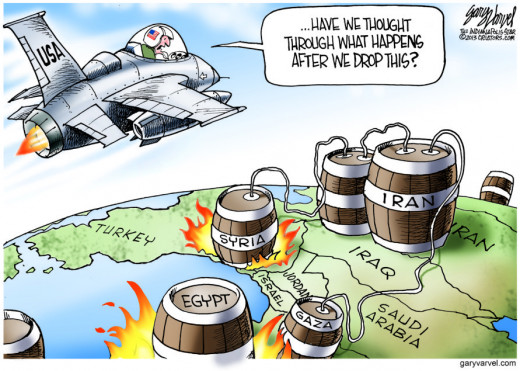The United States and the Middle East: With Friends (and Enemies) like these, who needs . . .?

The United States' Muddled Relationships in the Middle East
I don’t know about you, but I find the Middle East to be pretty confusing. It’s not just the various religious extremists doing crazy stuff. I also find it very difficult to determine what exactly the relationship is between the United States and many of the countries of the region. The tendency when trying to make sense out of the world is to break countries up into the categories of allies and adversaries. Many Middle Eastern nations, however, do not fit neatly into either category. So if anyone is an expert on the region, feel free to point out any facts in this little blog that might be inaccurate.
Iran – The United States’ relationship with Iran seems pretty clear cut. Ever since the Iranian Revolution and the hostage crisis about 35 years ago, Iran has been near the top of our least favorite countries list. Iran has consistently made trouble for the United States, often backing forces that directly opposed us or that have fought against our allies: insurgents in Iraq, Hezbollah and Hamas in their fights against Israel, Assad in Syria, Houthi rebels (apparently) in Yemen. But at the moment, the United States is on the verge of a landmark deal with Iran in regards to its nuclear program. The United States has also been carrying out air strikes against ISIS in both Syria and Iraq. And in both of these countries, Iranian backed fighters have generally done the most effective job of fighting against ISIS, with Iran being closely allied with the Iraqi government, an American ally since the invasion 12 years ago.
Syria – Ever since the Syrian civil war began, the United States has been saying that Assad should step down. The United States has also provided a certain amount of aid to some of the Syrian groups trying to topple the dictator. Unfortunately, ISIS has emerged in Syria and has become the most effective of the various insurgent groups (and is often fighting against the more moderate insurgents.) So when the United States carries out air strikes against ISIS, they are essentially helping Assad to survive. And as mentioned above, Iran is engaged in this fight against ISIS, an American enemy, in order to help its ally Syria.
Pakistan – The American relationship with Pakistan may be the strangest of all. Ever since the days of the Cold War, the United States has been pumping large amounts of military aid into this country. Pakistan, of course, has presented itself as an enemy of America’s enemies, whether it was communists during the Cold War or terrorists today. Meanwhile, this was a country in which Osama Bin Laden (and other Al Qaeda types) lived “in hiding” for many years. It is also a place that has a history of supporting the Taliban in Afghanistan and of using much of that American military aid to counteract its archenemy: India (an American ally). It is also a nation that possesses nuclear weapons (like its enemy India), which is worth mentioning given all of the fears about Iran’s nuclear program. But hey, that’s cool. Pakistan is our friend.
Saudi Arabia – Saudi Arabia has long been one of America’s friends in the region. From the American perspective, it is good to be on friendly terms with a country sitting on so much sweet crude oil. Never mind that Saudi Arabia is ruled by a corrupt royal family and has a long history of not letting women drive cars. Also, never mind that it has produced as many terrorists as anyone, including Bin Laden and 15 of the 19 hijackers on 9/11. These days, Saudi Arabia’s biggest concern is Iran, with both nations engaged in a Sunni vs. Shia / Arab vs. Persian struggle for dominance of the region. So Saudi Arabia has been carrying out military actions in Yemen against Houthis who it claims are a proxy for Iran, and the United States has felt obligated to support these actions. At the same time, of course, the United States has been engaged in nuclear talks with Iran, much to the chagrin of Saudi Arabia. And while Saudi Arabia is concerned about the rise of ISIS, it is difficult to see the Saudis joining forces with Iranian militias in Iraq and Hezbollah in Syria.
“Kurdistan” - Both Turkey and the Iraqi government are worried about Iraqi Kurds forming a fully independent nation, possibly inspiring both Kurds in Turkey and in Iran to create even more trouble. The United States, who has a good relationship with the Iraqi Kurds, doesn’t want the Kurds to seek full independence because we are allied with the Iraqi government and don’t want Iraq to splinter apart after so much American investment in trying to create a viable Iraqi state. Given the fact that the Kurds have managed to create the only truly stable part of Iraq, it’s unfortunate that the United States opposes the main thing that the Kurds want.
Meanwhile, post-Qadaffi Libya is a mess given the fact that the only thing that maintained order there was the Qadaffi regime. Post-Arab Spring Egypt, however, has managed to maintain order by reverting back into a nation ruled by a military dictator. The United States, a nation that has always talked about the glories of democracy, doesn’t seem to mind so much that Egypt has gone back to normal. Maybe the experiences of places like Libya and Iraq have shown that democracy may not be a viable option in this part of the world.
Every time I hear experts talk about this part of the world, it makes my head spin. So like I said before, feel free to correct any errors that I have made or details that were left out. And if nothing else, this quick attempt of making sense out of the area demonstrates that the United States often has no good options. Which bad guys in the neighborhood are the worst? And how do you continue to formulate policies when enemies in certain situations might be friends in others? It is tempting to argue that the United States should sit back as much as possible and let the people of the region duke it out. But when many of these places are so vital to the global economic system, is that really an option?




